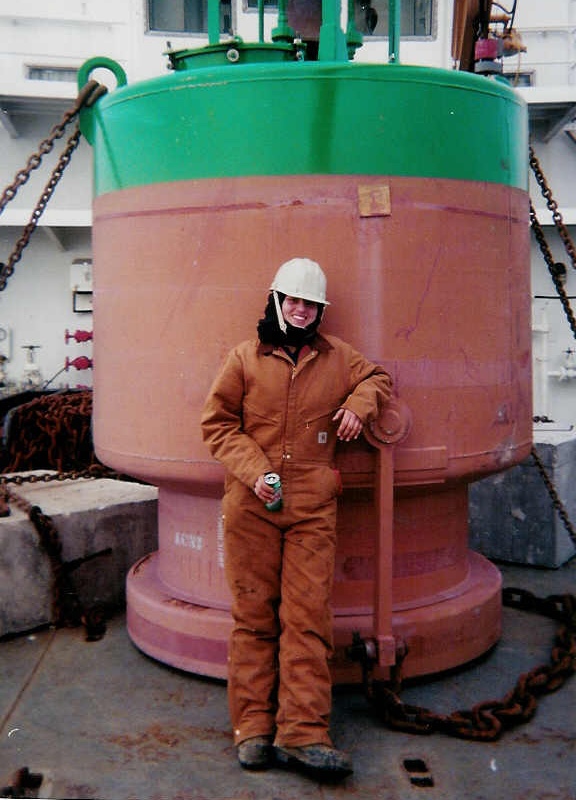A JOB-SPECIFIC CALLING
Jessica Rosa comes from a family with a long history of military service, yet her own military experience came about largely for more specific reasons. As a teenager, she had plans to become a marine biologist. But Rosa was one of eight siblings, and her parents could not afford to send all of them to college. Rosa had an excellent physics teacher in high school who suggested the Coast Guard as an alternate path to marine biology.
She took to the idea immediately, but it would take a little more time to convince her parents—especially her dad. But with the help of her recruiter, she eventually persuaded them to sign the paperwork. She was just 17 years old when she joined the Coast Guard in 1998.
MARINE SCIENCE TECHNICIAN
Rosa became a Boatswains Mate and learned to do the job of Marine Science Technician (MST). “It’s funny because I wanted to be an MST. But it was the worst job ever!” she recalls with a laugh. Marine Science Techs perform a variety of duties, including commercial vessel inspections, pollution response and prevention, waterways management, and disaster response. “You don’t even work with animals which is kind of unfortunate, but you clean up oil spills and stuff like that. I did it, it was ok. I couldn’t do it forever.”
Her first assignment was Portsmouth Harbor in New Hampshire, which allowed her to stay close to home. From there, she volunteered for temporary duty on the Abbey Burgess, a brand new coastal buoy tender that was based in Rockland, Maine.
“It was a black hull, so it was a dirty job. If you look up Dirty Jobs with Mike Rowe, he was on a buoy tender. You smelled like fish, and it was nasty. But I did it. We went out for three weeks, and they treat you just like the crew.”
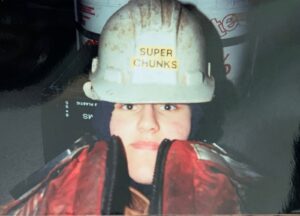

The seas were rough when the Abbey Burgess got underway, and Rosa was soon summoned to help clean up in the galley. The refrigerator had opened and spilled food all over. It was a tight space with too many conflicting smells. “The buoy tender is a flat-hulled boat, and I got a little seasick because we didn’t set the sea detail for heavy seas. Eggs and barbeque sauce—that’s all I’m gonna say!”
After Rosa slept off her sea sickness, she went back to work and found someone had stuck a label on her helmet christening her with the nickname Super Chunks. She laughs about it now, but says she’s never eaten eggs with barbecue sauce since.
A LIFECHANGING INJURY
Rosa worked many cases that would put her in the water on a variety of Coast Guard vessels. But one case in New Hampshire would change everything.
She went out one day with two more senior petty officers on a rescue mission. “We were on a case to go rescue some kids off a jetty. We were on a RHIB, which is the little orange boat—it was not the right boat to take for the seas that we were in.”
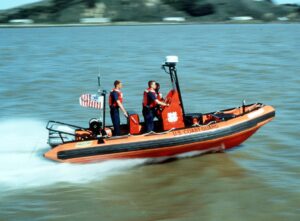

Rosa held the boat railing as they headed toward their search and rescue case. The boat knocked about angrily in the choppy waters, and her head slammed into the railing. “I didn’t do anything about it that day, but the next day I was throwing up. I had bruises and looked like I was beat up.”
She was sent immediately to the hospital. The blow to her head resulted in a traumatic brain injury (TBI) that she is still dealing with 20 years later.
NO PLACE FOR PARENTHOOD
Rosa served four and a half years and planned to continue her career in the Coast Guard—she even reenlisted for another tour. But her plans changed after 9/11 when she had her first child. At the time, she was stationed at the Coast Guard Academy in New London, Connecticut, and married to a man who was also Active Duty Coast Guard. He separated from service a few months after 9/11, while she stayed and continued to juggle military service with new motherhood.
“I stayed in, but it was hard being a mom and being in the military. To top it off, I was breastfeeding, so I had to pump. But there was no place for me to pump.”
Like many mothers in the military, she found the task necessary but impossibly difficult. She faced a lot of resistance from people who failed to understand why. “I had to go pump in the bathroom, and it was like, I was taking time out of their day. You’ve got to feed your child, you know what I mean?”
OTHER LOGISTICAL CHALLENGES
There were other logistical challenges—one of the biggest being access to childcare. While Rosa was stationed at the Coast Guard Academy, the base daycare was not actually on base. Military installations put tighter security protocols in place in the months following 9/11, and leaving the base was discouraged. But Rosa found herself having to leave base twice a day to access Coast Guard daycare for her infant son, which upset her leadership. “They were upset with me because I was leaving. What do you want me to do, bring my kid to work?”
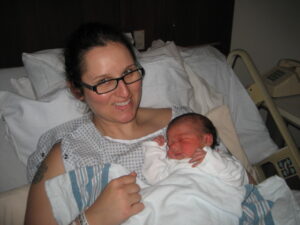

While she understood her first priority was the military, Rosa was bothered by the complete lack of support for parents who serve. “Being a woman, being a mom was not a priority.” Whether the issue was breastfeeding or childcare, it seemed as if there was no interest in trying to understand the challenge or working with parents who just needed to solve a problem so they could get back to the mission at hand.
“As a woman in the military, I think you get easily taken advantage of. And God forbid you get pregnant in the military. There’s no sympathy, no empathy, no care—nothing. And having to pump in the bathroom—I don’t think anyone wanted to talk about it. It was just taboo.”
THE TRANSITION
As the old saying goes, life is what happens while you’re busy making other plans. When Rosa first joined the Coast Guard, she assumed she would do 20 years and retire. But by her son’s first birthday, she realized it was time to adjust the plan. Rosa ended up separating from the Coast Guard under a program called Care of a Newborn Child.
While she misses being in the military, Rosa still knows she made the right decision given the circumstances. “I couldn’t be a good mom to him. I couldn’t. Since I got a divorce, I did what I had to do for my son.”
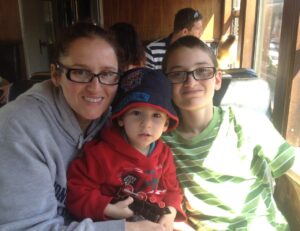

Rosa made her decision without hesitation. But the transition was still a tough one—a reality that many separating service members face. “I was transitioning out, but it was hard because I wasn’t ready to let go yet. I wasn’t ready to let my military go. It was such a big part of me.”
But serving other Veterans helped. Rosa did EMT training while in the Coast Guard, which led her to work in health care after the military. She took a job at the VA hospital in West Haven, Connecticut. She was excited to help other Veterans while maintaining a connection to her service. “I got to keep a lot of my military—I got to talk like I was still in. I was able to keep a lot of my stories alive.”
Rosa often cared for a half dozen or more patients in respite or hospice. She thrived in the environment and stayed for two and a half years. She left with intentions for nursing school, but life interrupted her plans once again.
SUBSTANDARD VA HEALTHCARE
At one point Rosa experienced sudden, excruciating back pain and she was uninsured at the time. Because she qualified for VA care as a Veteran, she was required by state law to use it. So she went to the emergency room, which happened to be at the same VA hospital where she used to work. The VA doctor dismissed her acute pain as sciatica. But Rosa was unwilling to backdown. She argued with the doctor through her searing pain, holding firm in her stance. “You may be a doctor, but this is my body. I’ve had sciatica. This isn’t sciatica.” When they finally performed an MRI, it showed two herniated discs.
“There was such a lack of communication in the VA system, I think—and when you’re a young Veteran, it’s hard for them to believe that you could be in such bad shape. But I don’t think they had the resources to take care of us.”
“You may be a doctor, but this is my body. I’ve had sciatica. This isn’t sciatica.” When they finally performed an MRI, it showed two herniated discs.
Rosa was scheduled for a minimally invasive, laparoscopic surgery to repair the herniated discs. But two days before the procedure, she got a call from her neurosurgeon with the news that they didn’t receive the equipment needed to perform it. He told her this would mean doing her surgery the old fashioned way, resulting in a longer surgery, a bigger scar, and more post-op pain.
The only other option she was presented with was to start the process over, which could take six months. “But at that point I had no feeling in my leg. I still wasn’t driving. They were telling me I could be paralyzed if I waited too much longer.” She couldn’t risk waiting.
A CURE WORSE THAN INJURY
Nearly two months after her back surgery, Rosa came down with flu-like symptoms. The VA diagnosed her with a bad cold and sent her home, but she continued to deteriorate. Eventually it got so bad that she felt like she was actually dying. When her family found her passed out in the kitchen in the middle of the night, they took her to the ER.
Because the VA misdiagnosed her condition, her infection spiraled out of control. The ER doctor told her if she had waited one more day, she likely would have died.
PROS AND CONS OF VA HEALTHCARE
Having been both an employee and a patient in the VA hospital system gives Rosa an added layer of perspective on VA care. Male or female, she doesn’t believe patients are always appreciated. But she found additional challenges as a young woman trying to navigate care in the VA healthcare system. “Being a young female, I don’t think I was seen as someone who could be in as rough shape as I was.”
Rosa had other, unrelated experiences at her VA hospital that went beyond substandard care, pushing into the realm of medical negligence. In one instance, a routine, women’s preventative care exam was so botched she had to have two surgeries to correct it. “I tried reporting it, and nothing. They said there was no service connection, and I couldn’t claim it.”
Despite some of her alarming experiences with VA medical care, there have been some positives for Rosa.
She no longer receives direct care at the VA, but she does miss some of the doctors she had there. Her back surgery post-op care was very good, and she felt the mental health care at her facility was excellent. She now uses VA Community Care to avoid setting foot in the VA hospital altogether.
A LIFE-CHANGING PROCEDURE FOR CHRONIC PAIN RELIEF
In 2022, Rosa turned to outside medical care to have a spinal cord stimulator permanently implanted. She found it to be immediately life-changing. It now helps her manage her chronic pain, greatly reducing her need for medication. It’s also given her a sense of hope that she would like to pay forward to other Veterans fighting the same battle. “If I can give other women with chronic pain some knowledge of what’s out there besides drowning yourself in pills…” She now sees an alternative path for herself and others to climb out from under the crushing burden of chronic pain and regain a sense of independence.
LAYERS OF INVISIBILITY
The injuries Rosa sustained in the Coast Guard have had a big impact on her life. In addition to the traumatic brain injury, Rosa also sustained a back injury while on active duty, all by the age of 21. Now at 42, she is unable to drive and has a disability rating from the VA. “I was told by the VA when I was 24 that I had the back of an 80 year old, and it’s just gotten worse over time. It’s not even about the money. It’s just, can you guys help me? I want to drive. I haven’t driven in years.”
While many in Rosa’s family see her as a Veteran and understand her disability, it seems to be harder for others around her to comprehend. Like other veterans her age living with disability, Rosa finds herself cloaked in a deeper form of invisibility. Layers of ageism, gender bias, and misunderstanding around disability make it difficult for people to understand the realities of her life.
“I see myself as a Veteran, but when I say I’m a disabled Veteran, it’s really hard. Because people wonder, what the hell did you do in the Coast Guard to get hurt?”
When we think of a disabled Veteran, it’s easy to imagine a man, at least in his 60s, with a missing limb or some other visible form of injury. We don’t think of a 22 year old woman with no outward signs of injury who is physically unable to drive or work.
At times, Rosa is met with disbelief when she presents herself as a Veteran—especially if disability is relevant to the conversation. “I see myself as a Veteran, but when I say I’m a disabled Veteran, it’s really hard. Because people wonder, what the hell did you do in the Coast Guard to get hurt?”
BAILEY THE SERVICE DOG
Thankfully there are dogs in this world who understand disability in ways that we are incapable of. Bailey has been an important presence in Rosa’s post-military life since 2018. As her service dog, Bailey is innately tuned to her pain levels and understands how to help.
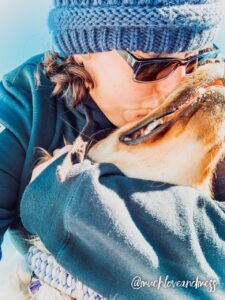



Until her spinal cord stimulator was implanted, Rosa lived with intense nerve pain. Bailey would notice the differences in her breath and body language, and she was right there to help. “I’ve never taught her this, but she knows to sit on me, like she’s applying deep pressure therapy. It’s like she just knows to put that pressure where I need it.”
See Resting Bailey Face and other Bailey adventures on her Instagram page.
A PROUD LEGACY OF FAMILY SERVICE
Seventeen year old Jessica Rosa would not have joined the Coast Guard at all if her parents hadn’t given their legal blessing. In the beginning, Rosa’s father was not on board with her plans. As a Veteran himself (World War II), he was adamant that his daughters did not belong in the military. But after touring a Coast Guard Station with her and getting a glimpse of what her service would be like, he slowly came around.
“God rest his soul, he’s gone now. But when I graduated, he got that picture of me and he showed everybody. ‘Look at my daughter. She’s in the Coast Guard. She’s in the Coast Guard!’ And when he came up to visit me, he was like, ‘that’s my daughter. My daughter’s in the military.’ He was always so proud.”
In turn, she is proud to have continued an extensive family legacy of service that covers nearly every branch. Rosa was the first woman in her family to join the military, and her twin sister would later follow suit.
“My husband was not in the military, and he’s like, ‘I don’t think I could have done it. I can’t believe you did this.’” Her youngest son has seen pictures of her Coast Guard days and regards that time in her life with a bit of awe, but also wonders how she did it. “Now I’m falling apart at the seams. I was a lot younger then.”
STRENGTH AND PERSPECTIVE
On balance, Rosa found many positives from her service. The Coast Guard instilled in her the values of honor and respect and spurred a tremendous amount of growth in her life. “It made me who I am today. I’m a stronger person because of the military. It gave me a different perspective on life. It gave me the tools that I needed to survive.”
Serving in the military also made higher education accessible for Rosa after all. She now has a bachelors in psychology and a masters in licensed professional counseling. “I don’t think I would have been able to do that without the Coast Guard.”
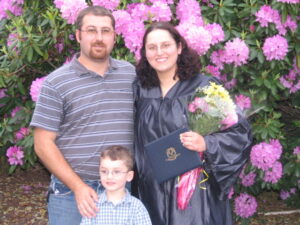

Lady Vet is honored to feature the voices and faces of women Veterans. Have something to share? Let’s connect! Email us at hello@ladyvetusa.com or DM on Facebook / Instagram.
![]()
![]()


